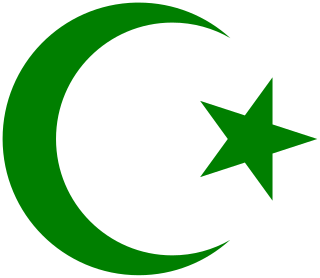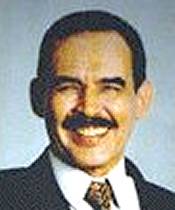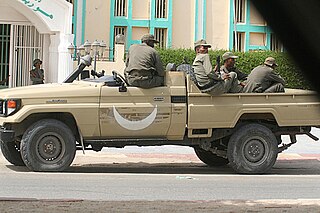| |||||||||||||||||||
| |||||||||||||||||||
All 95 seats to the National Assembly 48 seats needed for a majority | |||||||||||||||||||
|---|---|---|---|---|---|---|---|---|---|---|---|---|---|---|---|---|---|---|---|
| |||||||||||||||||||
 |
|---|
| This article is part of a series on the politics and government of Mauritania |
|
Parliamentary and municipal elections in Mauritania occurred on 19 November and 3 December 2006. [1] [2] At least 28 political parties competed to comprise the lower house of parliament, the National Assembly; Islamist parties were banned, but many Islamists ran as independent candidates. 95 seats in the National Assembly were at stake in the election, along with over 200 local councils. [3]

Islamism is a concept whose meaning has been debated in both public and academic contexts. The term can refer to diverse forms of social and political activism advocating that public and political life should be guided by Islamic principles or more specifically to movements which call for full implementation of sharia. It is commonly used interchangeably with the terms political Islam or Islamic fundamentalism. In academic usage, the term Islamism does not specify what vision of "Islamic order" or sharia are being advocated, or how their advocates intend to bring them about. In Western mass media it tends to refer to groups whose aim is to establish a sharia-based Islamic state, often with implication of violent tactics and human rights violations, and has acquired connotations of political extremism. In the Muslim world, the term has positive connotations among its proponents.
About 600 independent candidates ran in the election, many of whom were grouped into the National Rally of Independents (RNI). Many members of the RNI were formerly members of the Democratic and Social Republican Party, which had ruled the country under President Maaouya Ould Sid'Ahmed Taya. [4]
The National Rally of Independents is a political party in Morocco.

Maaouya Ould Sid'Ahmed Taya is a Mauritanian military officer who served as the president of Mauritania from 1984 to 2005. Having come to power through a military coup, he was ousted by a military coup himself in 2005. Prior to his presidency, he was the 5th Prime Minister of Mauritania.
Before the first round's count was complete, Ahmed Ould Daddah claimed victory for his party, the Rally of Democratic Forces (RFD), saying that it was "the country's biggest political force", and claiming that the eight-party coalition including the RFD had won a majority. The Popular Alliance for Progress (APP), a party for former slaves that is also part of the coalition, and the renamed former ruling party, the Republican Party for Democracy and Renewal, were also reported to have performed well. [5] Results from the first round confirmed a strong showing for the RFD, which won 12 out of the 43 declared seats; [3] [6] independent candidates also did well, taking 24 seats. [6] For 52 seats, however, candidates did not receive majorities and these seats had to be decided in the second round. [3] [6]
Ahmed Ould Daddah is a Mauritanian economist, politician and civil servant. He is a half-brother of Moktar Ould Daddah, the first President of Mauritania, and belongs to the Marabout Ouled Birri tribe. He is currently the President of the Rally of Democratic Forces (RFD) and was designated as the official leader of the opposition following the 2007 presidential election, in which he placed second.
The Democratic Republican Party for Renewal is a political party in Mauritania. Formerly known as the Democratic and Social Republican Party (PRDS),, the grouping has changed its identity and adjusted its political stance following the 2005 coup. Formerly supportive of President Maaouya Ould Sid'Ahmed Taya and his pro-Israeli stance, the party has since denounced Taya's policies and the mid-2006 Israeli military campaign in Lebanon.
After the second round was held on 3 December, the coalition of former opposition parties had 39 seats (including 15 for the RFD), with an additional two seats for independents supporting the coalition. Independents won 41 seats, 39 of which were part of the RNI. The former ruling party won seven seats. [4]
17.89% of the deputies elected were female. [4]
Messaoud Ould Boulkheir of the APP was elected as President of the National Assembly on April 26, 2007. There were 93 deputies present for the vote, and 91 of them voted for Boulkheir; two other deputies, Babah Ould Ahmed Babou and El Arbi Ould Jideyne, each received one vote. [7]
Messaoud Ould Boulkheir is among the first Haratine to become a political leader in Mauritania. Messaoud also contributed significantly to the end of the 1989 events in Mauritania, protecting the right of the victims and the emancipation of the Haratine in Mauritania with his party.
| Parties | Votes | % | Seats 1st round | Seats 2nd round | Total seats | ||
|---|---|---|---|---|---|---|---|
| Al-Mithaq (moderate Islamist independents) | 10 | 31 | 41 | ||||
| RFD-UFP | Rally of Democratic Forces (Regroupement des Forces Démocratiques) | 12 | 3 | 15 | |||
| Union of Forces of Progress (Union des Forces du Progrès) | 3 | 5 | 8 | ||||
| RFD-UFP | 0 | 2 | 2 | ||||
| Republican Party for Democracy and Renewal (Parti Républicain Démocratique et Renouvellement) | 4 | 3 | 7 | ||||
| APP-HATEM | People's Progressive Alliance (Alliance populaire progressiste) | 4 | 1 | 5 | |||
| Mauritanian Party of Union and Change (Parti mauritanien de l'union et du changement-HATEM) | 2 | 0 | 2 | ||||
| APP-HATEM | 0 | 2 | 2 | ||||
| Rally for Democracy and Unity (Rassemblement pour la Démocratie et l'Unité) | 2 | 1 | 3 | ||||
| Union for Democracy and Progress (Union pour la Démocratie et le Progrès) | 1 | 2 | 3 | ||||
| Democratic Renovation (Rénovation Démocratique) | 2 | 0 | 2 | ||||
| People's Front (Front populaire) | 1 | 0 | 1 | ||||
| Social-Democratic Unionist Party (Parti unioniste démocratique et socialiste) | 1 | 0 | 1 | ||||
| National Rally for Democracy, Liberty and Equality (Rassemblement national pour la liberté, la démocratie et l'égalité) | 1 | 0 | 1 | ||||
| Union of the Democratic Center (Union du centre démocratique) | 0 | 1 | 1 | ||||
| Alternative (Alternative) | 0 | 1 | 1 | ||||
| Total | 43 | 52 | 95 | ||||
| Source: IPU | |||||||






